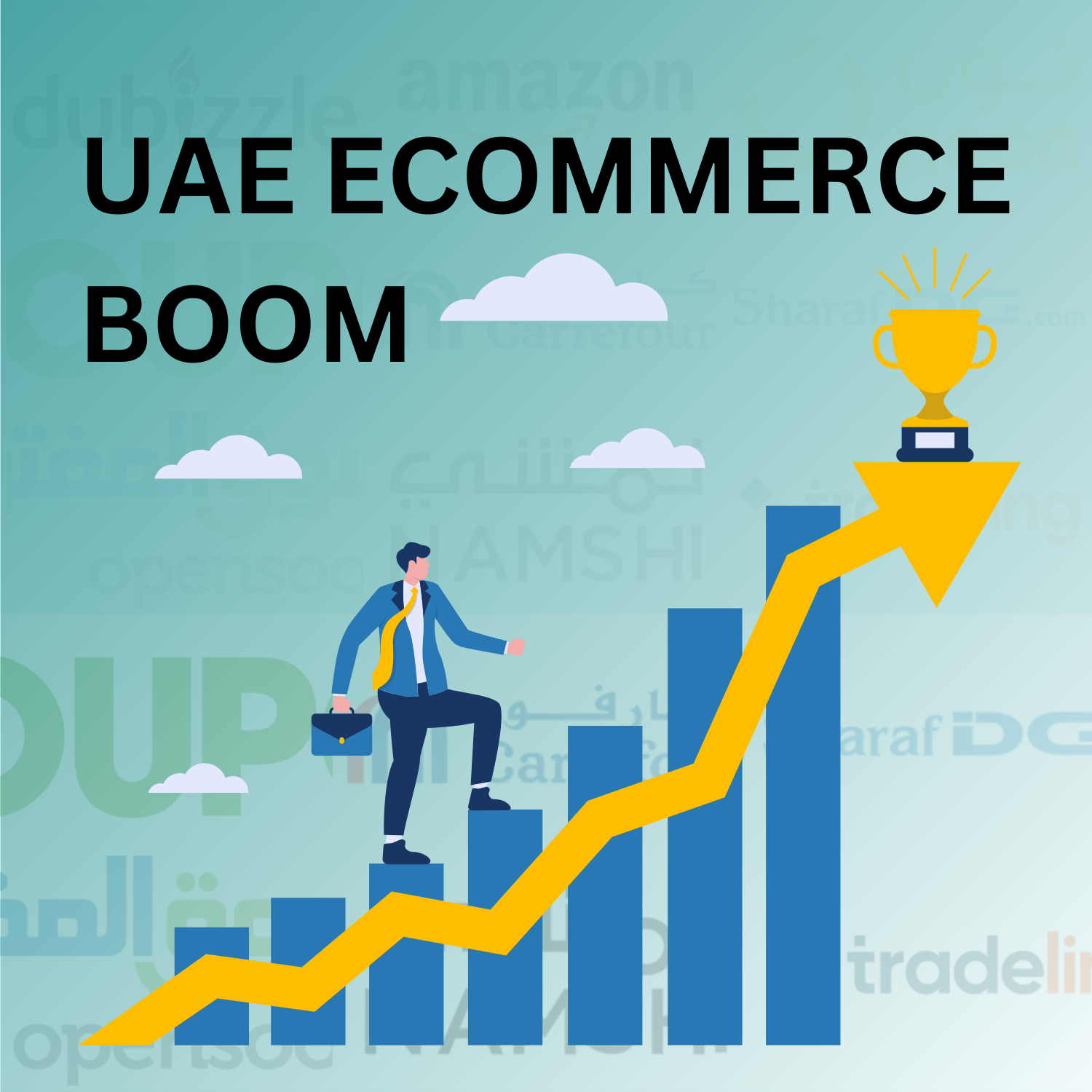A Comprehensive E-commerce Guide
The United Arab Emirates (UAE) isn’t just a land of towering skyscrapers and luxurious lifestyles; it’s a nation undergoing a rapid and remarkable digital transformation. With a visionary government leading the charge, the UAE is investing heavily in technology and innovation, positioning itself as a global hub for digital commerce and entrepreneurship. This digital revolution is reshaping every facet of life in the UAE, from how people work and communicate to how they shop and consume. At the heart of this transformation lies the e-commerce boom, a phenomenon that’s reshaping the retail landscape and creating unprecedented opportunities for businesses and consumers alike.
Government Initiatives: Fueling the Digital Fire
The UAE government has been instrumental in driving this digital transformation. Initiatives like Dubai CommerCity, a dedicated e-commerce free zone, and the National Program for Artificial Intelligence, which aims to integrate AI into various sectors, are just a few examples of the government’s commitment to fostering a thriving digital ecosystem. These initiatives, coupled with a robust technological infrastructure and a supportive regulatory environment, have created a fertile ground for e-commerce to flourish in the UAE.
E-commerce: The Rising Star of the UAE Economy
E-commerce has emerged as a shining star in the UAE’s economic landscape. With a young, tech-savvy population and a high internet penetration rate (over 99%), the UAE is a prime market for online businesses. The convenience, variety, and competitive prices offered by e-commerce platforms have captivated consumers, leading to a surge in online shopping. According to a report by Statista, the UAE’s e-commerce market is projected to reach a staggering US$9.2 billion by 2026. This exponential growth is a testament to the increasing popularity of online shopping and the vast potential that lies ahead for e-commerce businesses in the region.
Factors Driving the E-commerce Boom
The UAE’s e-commerce boom is not a spontaneous phenomenon; it’s the result of a confluence of factors:
- Increasing Internet and Smartphone Penetration: The UAE boasts one of the highest internet and smartphone penetration rates in the world. This widespread connectivity has fueled the growth of e-commerce, making it more convenient for consumers to browse, compare, and purchase products online.
- Changing Consumer Behavior and Preferences: The UAE’s consumer landscape is evolving rapidly. A new generation of tech-savvy and digitally native consumers is emerging, and their shopping habits are vastly different from those of previous generations. These consumers are more comfortable with online shopping, value convenience and speed, and are increasingly seeking personalized experiences. The COVID-19 pandemic further accelerated this shift towards online shopping.
- Government Initiatives: The UAE government has played a pivotal role in fostering the growth of e-commerce through various initiatives and policies. The establishment of Dubai CommerCity, a dedicated e-commerce free zone, has attracted numerous international and local businesses to set up their online operations in the UAE. Moreover, the government’s focus on digital transformation and innovation has created a supportive environment for e-commerce businesses.
Key E-commerce Trends in the UAE: Riding the Digital Wave
The UAE’s e-commerce landscape is not just growing; it’s evolving at a breakneck pace, with new trends and technologies constantly emerging. Staying ahead of the curve is essential for businesses to remain competitive and capitalize on this market’s immense opportunities.
- The Rise of Mobile Commerce: In a country where smartphone penetration exceeds 73%, mobile commerce is a dominant force. Consumers are increasingly using their smartphones to browse, research, and purchase products online. Businesses must ensure their online stores are optimized for mobile devices.
- Social Commerce: Social media platforms are becoming powerful e-commerce channels. Social commerce, the practice of buying and selling products directly through social media platforms, is gaining traction in the UAE.
- Personalization: UAE consumers are increasingly seeking personalized shopping experiences that cater to their individual preferences and needs. E-commerce businesses can leverage data analytics and AI-powered tools to offer personalized product recommendations, targeted promotions, and tailored content.
- Fast Delivery: UAE consumers expect fast and reliable delivery, with same-day or next-day delivery becoming increasingly popular. Businesses are investing in efficient logistics and fulfillment solutions to meet this demand.
- Emerging Payment Methods: The UAE is witnessing a shift towards digital payment methods, with digital wallets and Buy Now Pay Later (BNPL) options gaining popularity. Businesses must adapt by offering a variety of payment options.
Challenges and Opportunities for E-commerce Businesses in the UAE: Navigating the Shifting Sands
While the UAE’s e-commerce landscape is ripe with opportunity, it’s not without its challenges.
- Logistics: Efficient logistics and delivery are crucial. Businesses must grapple with the complexities of last-mile delivery, ensuring timely and reliable delivery to customers across the vast and diverse landscape.
- Payment Gateways: Secure and convenient payment options are crucial for building customer trust and driving conversions. Businesses must cater to a diverse range of payment preferences.
- Customer Trust: Building customer trust is paramount. Consumers need to feel confident that their personal and financial information is secure, that the products they purchase are genuine, and that they will receive timely and efficient customer service.
- Localization and Cultural Sensitivity: The UAE is a culturally diverse country, and businesses must be mindful of local customs and preferences. Localization goes beyond simply translating content into Arabic. It involves understanding the nuances of the local culture, adapting to local shopping habits, and building relationships with local influencers and partners.
- Emerging Technologies: The UAE is a hotbed for technological innovation, and emerging technologies like artificial intelligence (AI) and virtual reality (VR) are poised to revolutionize the e-commerce landscape. By embracing these technologies, businesses can enhance the customer experience, streamline their operations, and gain a competitive edge in the market.
Success Stories: UAE E-commerce Brands Leading the Way
The UAE’s e-commerce landscape is vibrant, teeming with innovative brands that are leveraging digital transformation to achieve remarkable success.
- Noon: A homegrown e-commerce platform that has rapidly risen to become a dominant force in the UAE market.
- Amazon.ae: The UAE version of the global e-commerce giant, offering a wide range of products, competitive prices, and reliable delivery services.
- Namshi: A leading fashion and lifestyle e-commerce platform, has captured the hearts of young and trendy shoppers in the UAE.
These success stories demonstrate the importance of understanding the local market, focusing on customer experience, embracing innovation, and investing in technology and logistics.
E-commerce Boom in UAE: A Glimpse Beyond the Horizon
The UAE’s e-commerce sector is on the cusp of a transformative era. The UAE’s e-commerce market is projected to maintain its upward trajectory, with estimates suggesting it could reach a staggering US$17 billion by 2027. This exponential growth is fueled by a confluence of factors, including increasing internet penetration, a growing preference for online shopping, and supportive government initiatives.
The future of e-commerce in the UAE is intrinsically linked to the adoption of emerging technologies. These cutting-edge innovations are poised to revolutionize the way consumers shop and interact with brands online.
- Artificial Intelligence (AI): AI-powered chatbots, personalized recommendations, and dynamic pricing algorithms are already enhancing the e-commerce experience. In the future, we can expect AI to play an even more significant role in areas like fraud detection, inventory management, and customer service.
- Virtual Reality (VR) and Augmented Reality (AR): These immersive technologies are transforming the way consumers experience products online. Virtual try-ons, 360-degree product views, and interactive shopping experiences are just a few examples of how VR and AR are reshaping e-commerce.
- Blockchain: This decentralized technology has the potential to revolutionize supply chain management, ensuring transparency, traceability, and security in e-commerce transactions.
- Drone Delivery: While still in its nascent stages, drone delivery holds the promise of faster and more efficient last-mile delivery, especially in a geographically diverse country like the UAE.
As consumers become more conscious of their environmental and social impact, sustainability and social responsibility are emerging as key considerations in their purchasing decisions. E-commerce businesses in the UAE must prioritize sustainable practices, such as eco-friendly packaging, ethical sourcing, and carbon-neutral shipping, to appeal to this growing segment of conscious consumers.
Conclusion
The future of e-commerce in the UAE is bright, but it’s not without its challenges. Businesses must stay abreast of the latest technological advancements, adapt to changing consumer preferences, and navigate the evolving regulatory landscape. However, for those who are willing to embrace innovation, prioritize customer experience, and invest in the right technologies, the rewards are immense. The UAE’s e-commerce market is a land of opportunity, and the future belongs to those who dare to dream big and adapt to the ever-changing digital landscape.








